Saturday, March 20, 2010
Saturday Of the Fourth Week In Lent
Stational Church:
S. Nicola in Carcere

From The Passion And Death Of Jesus Christ, by Saint Alphonsus de Liguori:
O my Jesus, and art not Thou, then, true king of the universe ? And how is it that Thou art now become king of sorrow and reproach ? See whither love has brought Thee ! O my most lovely God, when will that day arrive whereon I may so unite myself to Thee, that nothing may evermore have power to separate me from Thee, and I may no longer be able to cease to love Thee! O Lord, as long as I live in this world, I always stand in danger of turning my back upon Thee, and of refusing to Thee my love, as I have unhappily done in time past.
0 my Jesus, if Thou foreseest that by continuing in life I should have to suffer this greatest of all misfortunes, let me die at this moment, while I hope that I am in Thy grace ! I pray Thee, by Thy Passion, not to abandon me to so great an evil. I should indeed deserve it for my sins; but Thou dost deserve it not. Choose out any punishment for me rather than this. No, my Jesus, my Jesus, I would not see myself ever again separated from Thee.
Amen.
Devotions for a Lenten Saturday holy hour:
Divine Mercy Chaplet
Seven Penitential Psalms
Prayer of St. Thomas More
Threnus Prayer of Saint Augustine
Stabat Mater Dolorosa
Litany of Our Lady of Sorrows
Sorrowful Mysteries
S. Nicola in Carcere

From The Passion And Death Of Jesus Christ, by Saint Alphonsus de Liguori:
O my Jesus, and art not Thou, then, true king of the universe ? And how is it that Thou art now become king of sorrow and reproach ? See whither love has brought Thee ! O my most lovely God, when will that day arrive whereon I may so unite myself to Thee, that nothing may evermore have power to separate me from Thee, and I may no longer be able to cease to love Thee! O Lord, as long as I live in this world, I always stand in danger of turning my back upon Thee, and of refusing to Thee my love, as I have unhappily done in time past.
0 my Jesus, if Thou foreseest that by continuing in life I should have to suffer this greatest of all misfortunes, let me die at this moment, while I hope that I am in Thy grace ! I pray Thee, by Thy Passion, not to abandon me to so great an evil. I should indeed deserve it for my sins; but Thou dost deserve it not. Choose out any punishment for me rather than this. No, my Jesus, my Jesus, I would not see myself ever again separated from Thee.
Amen.
Devotions for a Lenten Saturday holy hour:
Divine Mercy Chaplet
Seven Penitential Psalms
Prayer of St. Thomas More
Threnus Prayer of Saint Augustine
Stabat Mater Dolorosa
Litany of Our Lady of Sorrows
Sorrowful Mysteries
Labels: Lent
Our Blessed Lady's Saturday

Hail Mary, full of sorrows, the Crucified is with thee; thou art pitiable amongst women, and pitiable is the Fruit of thy womb, Jesus. Holy Mary, Mother of the Crucified, implore for us, the crucifiers of thy Son, tears of contrition, now and at the hour of our death. Amen.
~~approved by Pope Pius IX in 1847
Labels: Lent, Our Blessed Lady
Friday, March 19, 2010
Feast Of Saint Joseph, 2010
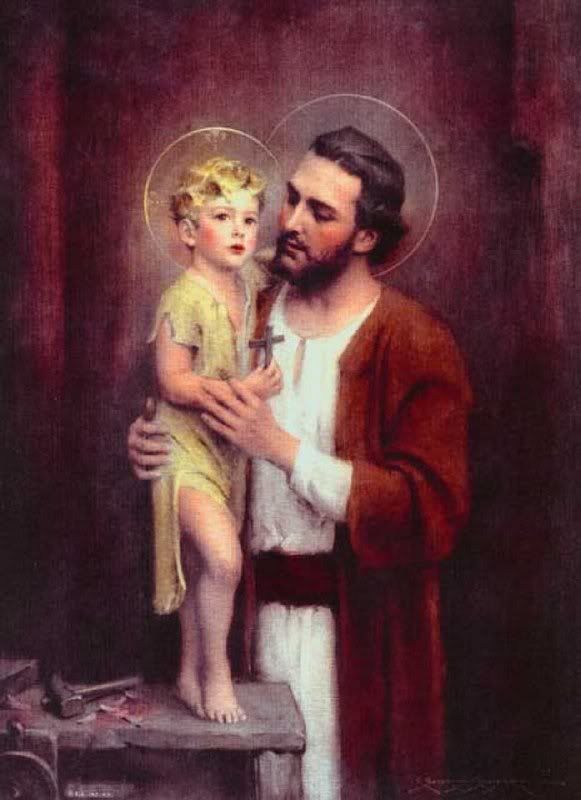
Litany of Saint Joseph
Lord, have mercy on us.
Christ, have mercy on us.
Lord, have mercy on us.
Christ, hear us.
Christ, graciously hear us.
God, the Father of Heaven,
Have mercy on us.
God the Son, Redeemer of the world,
Have mercy on us.
God the Holy Ghost,
Have mercy on us.
Holy Trinity, one God,
Have mercy on us.
Holy Mary,
Pray for us.
Holy Joseph,
Pray for us.
Noble Son of the House of David,
Pray for us.
Light of the Patriarchs,
Pray for us.
Husband of the Mother of God,
Pray for us.
Chaste Guardian of the Virgin,
Pray for us.
Foster-father of the Son of God,
Pray for us.
Sedulous Defender of Christ,
Pray for us.
Head of the Holy Family,
Pray for us.
Joseph most just,
Pray for us.
Joseph most chaste,
Pray for us.
Joseph most prudent,
Pray for us.
Joseph most valiant,
Pray for us.
Joseph most obedient,
Pray for us.
Joseph most faithful,
Pray for us.
Mirror of patience,
Pray for us.
Lover of poverty,
Pray for us.
Model of all who labor,
Pray for us.
Glory of family life,
Pray for us.
Protector of Virgins,
Pray for us.
Pillar of families,
Pray for us.
Consolation of the afflicted,
Pray for us.
Hope of the sick,
Pray for us.
Patron of the dying,
Pray for us.
Terror of the demons,
Pray for us.
Protector of the holy Church,
Pray for us.
Lamb of God, Who takest away the sins of the world,
have mercy on us.
Lamb of God, Who takest away the sins of the world,
have mercy on us.
Lamb of God, Who takest away the sins of the world,
have mercy on us.
V. He made him master of his house,
R. And ruler of all his possesions.
Let us pray:
O God, Thou wert pleased to choose Saint Joseph as the husband of Mary and the guardian of Thy Son. Grant that, as we venerate him as our protector on earth, we may deserve to have him as our intercessor in heaven. We ask this through Christ our Lord.
Amen.
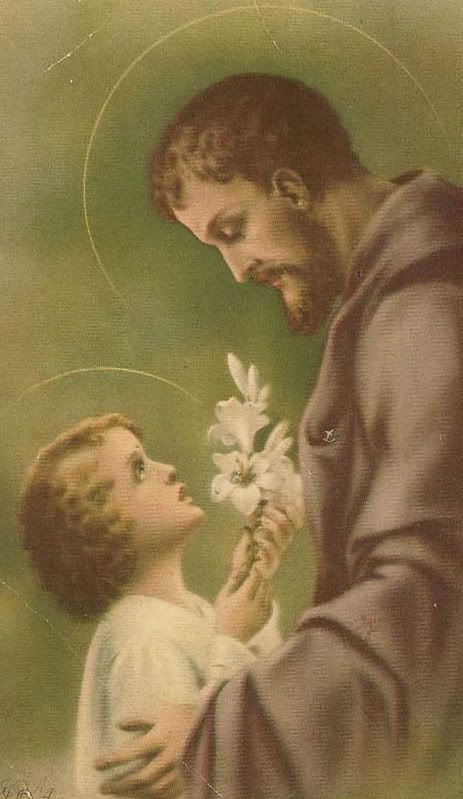
The Extensive Patronage of Saint Joseph

Zeppole di San Guiseppe
Or you can stop in at Maria's Pastry Shop, on Cross Street in Boston's North End for some, if you don't feel like making the pastry yourself.
Or you could just have some Sloppy Joes, I suppose.
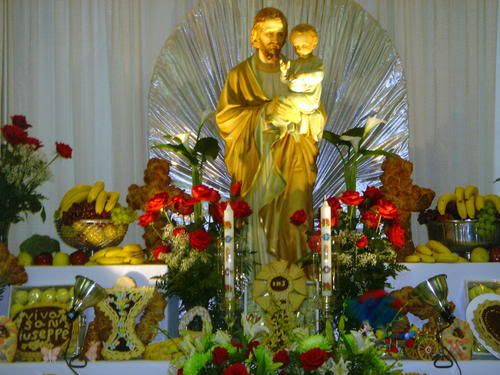
The Sicilian Custom of St. Joseph's Day Altars
And do not forget St. Joseph's vital role as patron of a happy death. Many saints are associated with the deathbed. St. Peter with his binding and loosing powers is popularly said to be the gatekeeper of Heaven. St. Michael has been said to be the escort of the newly departed soul, and the one who protects it from the demons waiting by the deathbed to snatch the soul and drag it to Hell. Our Blessed Lady is, of course, vital here, too (don't forget your daily Three Aves for a Happy and Holy Death). But St. Joseph is a principal patron of the deathbed. Why? Just think: he died in the arms of Jesus and Mary. Who has ever had a happier death than he?

Labels: Our Saintly Brethern
Friday At The Foot Of the Cross

Ant.
Remember not, Lord, my offenses, nor the offenses of my fathers, nor takest Thou vengeance upon them.
Psalm 101/102
2 HEAR, O LORD, my prayer: * and let my cry come to Thee.
3 Hide not Thy face from me: in the day of my distress, * incline Thy ear to me. On the day I call upon Thee, * hear me speedily.
4 For my days have vanished like smoke, * and my bones burn like dry wood in a fire.
5 My heart is dried up and withered like grass: * and so I have forgotten to eat my bread.
6 Because of my groaning, * my bones cleave to my flesh.
7 I am like a pelican in the desert: * I am like a night owl among the ruins.
8 I kept awake, * and am like a lone sparrow on the housetop.
9 All day my enemies reviled me: * in their rage against me they made a curse of me.
10 For I eat ashes like bread, * and mingle my drink with tears.
11 Because of Thy anger and indignation: * having lifted me up, Thou hast then cast me down.
12 My days are like a lengthening shadow, * and I have withered like grass.
13 But thou, O Lord, endurest for ever: * and Thy memorial for generations and generations.
14 Thou shalt arise and have mercy on Sion, for it is time to be merciful, * for the appointed time has come.
15 For her stones have pleased Thy servants: * and her dust moves them to pity.
16 All the Gentiles shall fear Thy name, O Lord, * and all the kings of the earth Thy glory.
17 For the Lord hath built up Sion: * and He shall be seen in His glory.
18 He hath regarded the prayer of the humble: * and he hath not despised their prayer.
19 Let these things be written for the next generation: * and the people that shall be created will praise the Lord:
20 For he hath looked down from his sanctuary on high: * from heaven the Lord hath looked upon the earth.
21 that he might hear the groans of those imprisoned * that he might release the children of the dead:
22 That they may declare the name of the Lord in Sion: * and His praise in Jerusalem;
23 when the people assemble together, * and kings, that they may serve the Lord.
24 He hath broken my strength in the way, * He hath cut short my days.
25 I shall say: "My God take me not away in the midst of my days: * Thy years are for generations and generations.
26 In the beginning, O Lord, Thou foundedst the earth: * and the heavens are the works of thy hands.
27 They shall perish but Thou shalt remain: * and all of them shall grow old like a garment:
And like clothing Thou shalt change them, and they shall be changed. * 28 But Thou art always the same, and Thy years have no end.
29 The children of Thy servants shall abide * and their offspring shall be established in Thy presence."
GLORY be to the Father, and to the Son, and to the Holy Ghost, as it was in the beginning, is now, and will be forever. Amen.
Prayer Against Gluttony
O wretched me, who hath forsaken Thee, Lord God, the font of living water. I have dug myself cisterns of earthly delights, broken cisterns, that can hold no living water! (cf Jer 2:13) Verily have I forgotten to eat my bread, the bread of life, having in it all delight and sweetness of taste. Instead I was eager to fill my belly with the husks pigs eat. (Lk 15:16) As yet food was in the mouth of the Sons of Israel, when God's anger descended upon them: and is so often spared me, who thru intemperance of food and drink has been formed in the likeness of a beast and not in Thy image, O God. O how in the end might I eat ashes like bread and mingle tears with my drink. May my food be to do Thy will in everything, Thou who shalt make us drink from the river of Thy delights. (Ps 35:9)
Ant.
Remember not, Lord, my offenses, nor the offenses of my fathers, nor takest Thou vengeance upon them.
Labels: Friday At the Foot Of the Cross, Lent
Friday Of the Fourth Week In Lent
Station Church:
S. Eusebio all'Esquilino

From The Passion And Death Of Jesus Christ, by Saint Alphonsus de Liguori:
O my Jesus ! how do I behold Thee weighed down with sorrow and sadness ! Ah, too much reason hast Thou to think that while Thou dost suffer even to die of anguish upon this wood, there are yet so few souls that have the heart to love Thee ! O my God! how many hearts are there at the present moment, even among those that are consecrated to Thee, who either love Thee not, or love Thee not enough ! O beautiful flame of love, thou that didst consume the life of a God upon the cross, oh, consume me too; consume all the disorderly affections which live in my heart, and make me live burning and sighing only for that loving Lord of mine, who, for love of me, was willing to end his life, consumed by torments, upon a gibbet of ignominy ! O my beloved Jesus! I wish ever to love Thee, and Thee alone, alone ; my only wish is to love my love, my God, my all.
Devotions for a Lenten Friday holy hour:
Dies Irae
Divine Mercy Chaplet
Seven Penitential Psalms
Prayer of St. Thomas More
Threnus Prayer of Saint Augustine
Devotions To the Holy Cross
The Stations of the Cross
Two weeks until Good Friday
S. Eusebio all'Esquilino

From The Passion And Death Of Jesus Christ, by Saint Alphonsus de Liguori:
O my Jesus ! how do I behold Thee weighed down with sorrow and sadness ! Ah, too much reason hast Thou to think that while Thou dost suffer even to die of anguish upon this wood, there are yet so few souls that have the heart to love Thee ! O my God! how many hearts are there at the present moment, even among those that are consecrated to Thee, who either love Thee not, or love Thee not enough ! O beautiful flame of love, thou that didst consume the life of a God upon the cross, oh, consume me too; consume all the disorderly affections which live in my heart, and make me live burning and sighing only for that loving Lord of mine, who, for love of me, was willing to end his life, consumed by torments, upon a gibbet of ignominy ! O my beloved Jesus! I wish ever to love Thee, and Thee alone, alone ; my only wish is to love my love, my God, my all.
Devotions for a Lenten Friday holy hour:
Dies Irae
Divine Mercy Chaplet
Seven Penitential Psalms
Prayer of St. Thomas More
Threnus Prayer of Saint Augustine
Devotions To the Holy Cross
The Stations of the Cross
Two weeks until Good Friday
Labels: Lent
Thursday, March 18, 2010
Thursday Of the Fourth Week In Lent
Station Church:
Ss. Silvestro e Martino ai Monti

From The Passion And Death Of Jesus Christ, by Saint Alphonsus de Liguori:
O my crucified Jesus ! to make Thyself loved by men Thou has spared nothing; Thou hast even given Thy life with a most painful death; how, then, can men who love their kindred, their friends, and even animals from whom they receive any token of affection, be so ungrateful to Thee as to despise Thy grace and Thy love, for the sake of miserable and vain delights ! Oh, miserable that I am, I am one of those ungrateful beings who, for things of no worth, have renounced Thy friendship, and have turned my back upon Thee. I have deserved that Thou shouldst drive me from Thy face, as I have often banished Thee from my heart. But I know that Thou dost not cease to ask my heart of me : Thou shalt love the Lord thy God.1 Yea, O my Jesus, as Thou desirest that I should love Thee and offerest me pardon, I renounce all creatures, and henceforth I desire to love Thee alone, my Creator and my Redeemer. Thou dost deserve to be the only object of my soul's love.
O Mary, Mother of God, and refuge of sinners, pray for me; obtain for me the grace of loving God, and I ask for nothing more.
Devotions for a Lenten Thursday Holy Hour:
Dies Irae
Divine Mercy Chaplet
Seven Penitential Psalms
Prayer of St. Thomas More
Threnus Prayer of Saint Augustine
Devotion To the Holy Face
Ss. Silvestro e Martino ai Monti

From The Passion And Death Of Jesus Christ, by Saint Alphonsus de Liguori:
O my crucified Jesus ! to make Thyself loved by men Thou has spared nothing; Thou hast even given Thy life with a most painful death; how, then, can men who love their kindred, their friends, and even animals from whom they receive any token of affection, be so ungrateful to Thee as to despise Thy grace and Thy love, for the sake of miserable and vain delights ! Oh, miserable that I am, I am one of those ungrateful beings who, for things of no worth, have renounced Thy friendship, and have turned my back upon Thee. I have deserved that Thou shouldst drive me from Thy face, as I have often banished Thee from my heart. But I know that Thou dost not cease to ask my heart of me : Thou shalt love the Lord thy God.1 Yea, O my Jesus, as Thou desirest that I should love Thee and offerest me pardon, I renounce all creatures, and henceforth I desire to love Thee alone, my Creator and my Redeemer. Thou dost deserve to be the only object of my soul's love.
O Mary, Mother of God, and refuge of sinners, pray for me; obtain for me the grace of loving God, and I ask for nothing more.
Devotions for a Lenten Thursday Holy Hour:
Dies Irae
Divine Mercy Chaplet
Seven Penitential Psalms
Prayer of St. Thomas More
Threnus Prayer of Saint Augustine
Devotion To the Holy Face
Labels: Lent
Wednesday, March 17, 2010
Saint Patrick's Day
Our Patron and Ghostly Father
The Book of Kells
Irish High Crosses
Our Lady of Knock
How To Make a Saint Patrick's Cross Button
How To Make a Saint Brigid's Cross
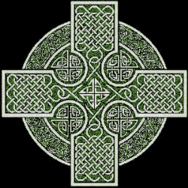
You can print up this Celtic Cross and make an appropriate St. Patrick's Day button out of it.
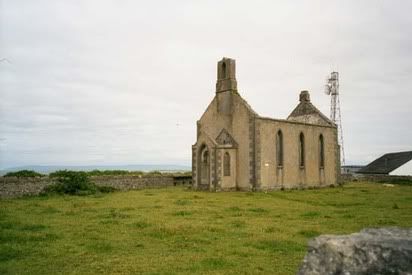

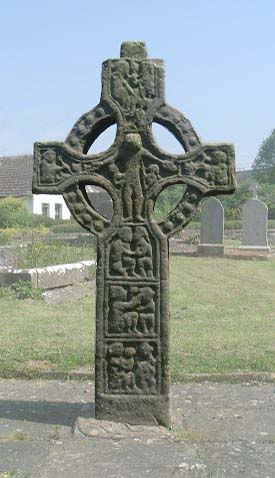
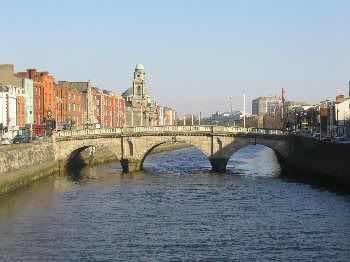
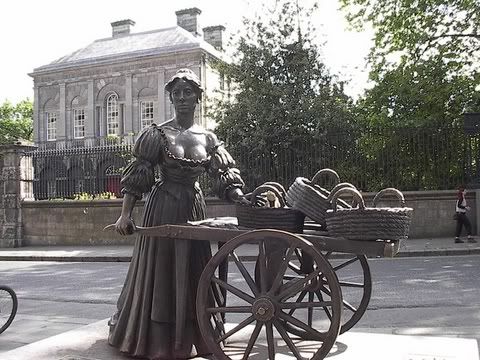

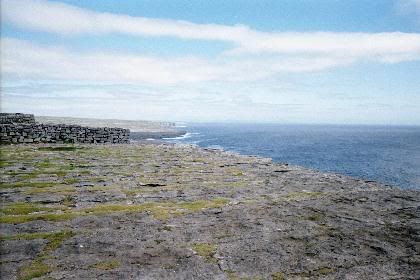



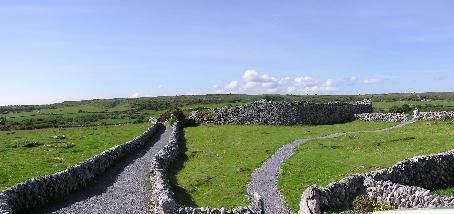
And I'll conclude with my favorite version of St. Patrick's Lorica (Breastplate):
I arise today
Through a mighty strength, the invocation of the Trinity,
Through the belief in the threeness,
Through confession of the oneness
Of the Creator of Creation.
I arise today
Through the strength of Christ's birth with his baptism,
Through the strength of his crucifixion with his burial,
Through the strength of his resurrection with his ascension,
Through the strength of his descent for the judgment of Doom.
I arise today
Through the strength of the love Cherubim,
In obedience of angels,
In the service of archangels,
In hope of resurrection to meet with reward,
In prayers of patriarchs,
In predictions of prophets,
In preaching of apostles,
In faith of confessors,
In innocence of holy virgins,
In deeds of righteous men.
I arise today
Through the strength of heaven, (God the Father)
Light of sun, (God the Son)
Radiance of moon, (Our Blessed Lady)
Splendor of fire, (God the Holy Ghost)
Speed of lightning, (Saint Michael)
Swiftness of wind, (Saint Gabriel)
Depth of sea, (Saint John the Baptist)
Stability of earth, (Saint Joseph)
Firmness of rock. (Saint Peter)
I arise today
Through God's strength to pilot me:
God's might to uphold me,
God's wisdom to guide me,
God's eye to look before me,
God's ear to hear me,
God's word to speak for me,
God's hand to guard me,
God's way to lie before me,
God's shield to protect me,
God's host to save me
From snares of devils,
From temptations of vices,
From everyone who shall wish me ill,
Afar and anear,
Alone and in multitude.
I summon today all these powers between me and all evils,
Against every cruel merciless power that may oppose my body and soul,
Against incantations of false prophets,
Against black laws of pagandom,
Against false laws of heretics,
Against craft of idolatry,
Against spells of witches and smiths and wizards,
Against every knowledge that corrupts man's body and soul.
Christ to shield me today
Against poison, against burning,
Against drowning, against wounding,
So that there may come to me abundance of reward.
Christ with me, Christ before me, Christ behind me,
Christ in me, Christ beneath me, Christ above me,
Christ on my right, Christ on my left,
Christ when I lie down, Christ when I sit down, Christ when I arise.
Christ in the heart and mind of every one who thinks of me,
Christ in the mouth of everyone who speaks of me or to me,
Christ in every eye that sees me or my works,
Christ in every ear that hears me or hears of me.
I arise today
Through a mighty strength, the invocation of the Trinity,
Through belief in the threeness,
Through confession of the oneness,
Of the Creator of Creation.
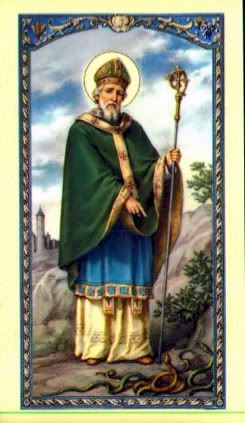

The Book of Kells
Irish High Crosses
Our Lady of Knock
How To Make a Saint Patrick's Cross Button
How To Make a Saint Brigid's Cross

You can print up this Celtic Cross and make an appropriate St. Patrick's Day button out of it.











And I'll conclude with my favorite version of St. Patrick's Lorica (Breastplate):
I arise today
Through a mighty strength, the invocation of the Trinity,
Through the belief in the threeness,
Through confession of the oneness
Of the Creator of Creation.
I arise today
Through the strength of Christ's birth with his baptism,
Through the strength of his crucifixion with his burial,
Through the strength of his resurrection with his ascension,
Through the strength of his descent for the judgment of Doom.
I arise today
Through the strength of the love Cherubim,
In obedience of angels,
In the service of archangels,
In hope of resurrection to meet with reward,
In prayers of patriarchs,
In predictions of prophets,
In preaching of apostles,
In faith of confessors,
In innocence of holy virgins,
In deeds of righteous men.
I arise today
Through the strength of heaven, (God the Father)
Light of sun, (God the Son)
Radiance of moon, (Our Blessed Lady)
Splendor of fire, (God the Holy Ghost)
Speed of lightning, (Saint Michael)
Swiftness of wind, (Saint Gabriel)
Depth of sea, (Saint John the Baptist)
Stability of earth, (Saint Joseph)
Firmness of rock. (Saint Peter)
I arise today
Through God's strength to pilot me:
God's might to uphold me,
God's wisdom to guide me,
God's eye to look before me,
God's ear to hear me,
God's word to speak for me,
God's hand to guard me,
God's way to lie before me,
God's shield to protect me,
God's host to save me
From snares of devils,
From temptations of vices,
From everyone who shall wish me ill,
Afar and anear,
Alone and in multitude.
I summon today all these powers between me and all evils,
Against every cruel merciless power that may oppose my body and soul,
Against incantations of false prophets,
Against black laws of pagandom,
Against false laws of heretics,
Against craft of idolatry,
Against spells of witches and smiths and wizards,
Against every knowledge that corrupts man's body and soul.
Christ to shield me today
Against poison, against burning,
Against drowning, against wounding,
So that there may come to me abundance of reward.
Christ with me, Christ before me, Christ behind me,
Christ in me, Christ beneath me, Christ above me,
Christ on my right, Christ on my left,
Christ when I lie down, Christ when I sit down, Christ when I arise.
Christ in the heart and mind of every one who thinks of me,
Christ in the mouth of everyone who speaks of me or to me,
Christ in every eye that sees me or my works,
Christ in every ear that hears me or hears of me.
I arise today
Through a mighty strength, the invocation of the Trinity,
Through belief in the threeness,
Through confession of the oneness,
Of the Creator of Creation.


Labels: Our Saintly Brethern
Saint Patrick's Day Fun Part 3, The Music
You will notice that this year, it is not all the Clancy Brothers and Tommy Makem, though I love them dearly, God rest their souls.
Makem and Clancy, The Rambles Of Spring
The Orthodox Celts, The Star Of the County Down
Ronnie Drew and the Dubliners, Dublin In the Rare Auld Times
Mary Black, Óró 'sé do bheatha 'bhaile
Johnny McEvoy, The Spanish Lady
The Dropkick Murphys, The Wild Rover
Cherish The Ladies, The Ballad of the Fox Hunter
Danny Doyle, Whiskey On A Sunday
Foster & Allen, Nancy Myles
The Rankin Family, Mo Run Geal, Dileas
The Dubliners, Seven Drunken Nights
The Dublin City Rambers, Molly Malone
Paddy Reilly, Carrickfergus
The Wolfe Tones, Serjeant William Bailey
The Makem Brothers and Brian Sullivan, Fare Thee Weel Enniskillen
The Clancy Brothers And Tommy Makem, Isn't It Grand, Boys?
The Corrs & The Cheiftains, A Shindig Medley
Davey Arthur & The Fureys, It's A Long Way From Clare To Here
Sean Dunphy, Delaney's Donkey
Luke Kelly & The Dubliners, The Monto
Jim McCann, Grace
Liam Clancy, The Patriot Game
The Irish Rovers, The Unicorn
Makem & Clancy, The Town Of Ballybay
The Chieftains, Lillibulero/The White Cockade
Robbie O'Connell, Kilkelly, Ireland
The Clancy Brothers & Tommy Makem, Johnny McEldoo
The Clancy Brothers And Tommy Makem, The Juice Of the Barley
Ronnie Drew & The Dubliners, The Parting Glass
Makem and Clancy, The Rambles Of Spring
The Orthodox Celts, The Star Of the County Down
Ronnie Drew and the Dubliners, Dublin In the Rare Auld Times
Mary Black, Óró 'sé do bheatha 'bhaile
Johnny McEvoy, The Spanish Lady
The Dropkick Murphys, The Wild Rover
Cherish The Ladies, The Ballad of the Fox Hunter
Danny Doyle, Whiskey On A Sunday
Foster & Allen, Nancy Myles
The Rankin Family, Mo Run Geal, Dileas
The Dubliners, Seven Drunken Nights
The Dublin City Rambers, Molly Malone
Paddy Reilly, Carrickfergus
The Wolfe Tones, Serjeant William Bailey
The Makem Brothers and Brian Sullivan, Fare Thee Weel Enniskillen
The Clancy Brothers And Tommy Makem, Isn't It Grand, Boys?
The Corrs & The Cheiftains, A Shindig Medley
Davey Arthur & The Fureys, It's A Long Way From Clare To Here
Sean Dunphy, Delaney's Donkey
Luke Kelly & The Dubliners, The Monto
Jim McCann, Grace
Liam Clancy, The Patriot Game
The Irish Rovers, The Unicorn
Makem & Clancy, The Town Of Ballybay
The Chieftains, Lillibulero/The White Cockade
Robbie O'Connell, Kilkelly, Ireland
The Clancy Brothers & Tommy Makem, Johnny McEldoo
The Clancy Brothers And Tommy Makem, The Juice Of the Barley
Ronnie Drew & The Dubliners, The Parting Glass
Labels: Our Saintly Brethern
Saint Patrick's Day Fun Part 2, Skellig Michael

I have often used an allusion in a sort of intellectual shorthand, and it recently occurred to me that a sizable chunk of even my well-informed audience may not get it.
I sometimes speak (justifiably) of the decline of traditional morality in rather apocalyptic terms, adding that there is no safe place, no "Skellig Michael" to which the civilized may repair to wait out the latest triumph of barbarism (gay marriage, overwhelming immigration, political correctness, safety Nazis, high taxes, Islamicization of Europe, environmental weirdness, vegetarianism, what have you).
Well, the reference to Skellig Michael comes from my varied reading. Four books in particular have shaped this little intellectual shortcut. Kenneth Clark in Civilization wrote that:
"Looking back from the great civilizations of twelfth-century France or seventeenth-century Rome, it is hard to believe that for quite a long time-almost a hundred years-Western Christianity survived by clinging to places like Skellig Michael, a pinnacle of rock eighteen miles from the Irish coast, rising seven hundred feet out of the sea."
Clark's theme was picked up and amplified by Thomas Cahill in his recent bestseller How the Irish Saved Civilization. Cahill's book is about the very phenomenon that Clark mentioned in his first chapter, the survival of Western Civilization.
You see, at the time of the barbarian takeover of the declining Roman Empire, civilization was in quite a plight. Learning declined markedly. Even high culture declined precipitously. In the looting of the pelf of the empire, many of the works of classical culture were lost. The Germanic warlords who came to replace other Roman officials in actual charge out in the provinces were often illiterate. They did nothing to encourage literacy or to preserve the Graeco-Roman literary deposit. While the Church preserved some of Graeco-Roman culture on the continent, she and her agents could not hold all together.
A great deal was preserved in the island hermitage/monasteries of the Irish, who had absorbed Roman culture through the work of St. Patrick and his successors. Skellig Michael, a particularly uninviting location in the Northern Atlantic, was one of those places where the traditions of Graeco-Roman culture and writings were preserved by the Irish monks until Europe had calmed down enough to allow for this learning to be re-exported to it.
Irish monasticism was not the safe, comfortable sort of Saint Benedict and those who follow him. It was the white martyrdom of the desert fathers, harsh, almost brutally ascetic in ways Saint Benedict rejected so that monasticism could be followed by many, rather than just the elite ascetics. It sought out desert places, wastes, inaccessible islands, deep forests. And there it enacted sometimes harsh penances, like the Cross Vigil, in which a monk held out his hands in the posture of the Lord on the cross for days or weeks at a time. Sometimes, these monks would make the Cross Vigil waist-deep in freezing water.
Their greatest enemy was not the lack of women or material goods. Indeed, they considered themselves as athletes in training for Heaven. Such deprivations were just routine. No. The real enemy was depression, acedia, or the noonday devil "the destruction that wasteth at noonday," in the words of the Psalmist, the feeling, which uncannily comes in the middle of the day, that you have made no progress, that you are wasting your time, indeed your life. I have, for the first tie in my life, come to know this scourge myself in the last 6 months. A formidable enemy indeed, one that I am not sure I have conquered. Indeed, it seems to return, in one guise or another, every few days.
But they also kept libraries and scriptoria, and spent some of their time studying such literary works as their limited involvement with the greater civilization of the continent before its collapse afforded them.
Once Europe had recovered somewhat from the initial shock of the fall of classical civilization and the breakdown of government of the Western Empire, Irish monks, venturing forth from fastnesses like Skellig Michael roamed about France, Germany, and Italy, bringing with them copies of the books from their monasteries, books in which much of Plato and Aristotle, Cicero and Ovid were preserved, some works that Europe had not seen in a hundred years and more. These Irish monks gained great influence in the Merovingian, and later in the Carolingian courts.
The period in which Ireland, in the form of its monks, "saved civilization" was roughly from the death of St. Patrick to the time of Charlemagne. Then, in rapid succession, new waves of barbarian invaders, Vikings, mercilessly plundered the Irish monasteries, attacking even remote Skellig Michael in 823, only a few years after the death of Charlemagne. Duns Scotus was the last great figure in this Irish Renaissance.
Skellig Michael itself has been described by the local (Newburyport) Irish-American author James Charles Roy in his superb book The Road Wet, The Wind Close: Celtic Ireland. He explored the place for a couple of bleak days. It is indeed from his description a desolate spot. It is indeed hard to imagine that here, a large part of western civilization's written heritage was preserved.
"Skellig Michael now stands before us....Even from afar it looks menacing, unfriendly, barren, seemingly a perfect cone rising from the sea. jet-black in colour and everywhere jagged, sharp. There doesn't seem to be a smooth place anywhere."
Nevertheless, Roy is probably correct in calling it the "very essence of Celtic Ireland."
Today, ithe island's inhabitants are three lighthouse keepers who rotate every few months to lessent he chances of going mad, puffins, rabbits, and various seabirds. The island has two peaks. The higher one has a Way of the Cross, after a local fashion. In the vale between the two peaks, under a windswept spit known as "The Saddle of Christ," is the monastery. The monastery was built of dry-laid stone, and consists of 6 clochans, or dwelling huts, circular and beehive shaped. There are two stone oratories.

The monastery was probably built around 650 A.D. It was almost literally carved out of the rock of the island. It is not certain when the Way of the Cross was developed. It consists of "The Needle's Eye," a narrow vertical shaft in the rock about 20 feet high which must be climbed, "The Stone of Pain," a smooth rock 14 feet high which must be scrambled up, and "The Spindle":
"...a long narrow fragment of rock, projecting from the summit of this frightful place, over a raging sea (700 feet below-GTF); and this is walked to by a narrow path only two feet in breadth, and several steps in length. Here the devotees, women as well as men, get astride of this rock, and so edge forward, until they arrive at a stone cross...and here, having repeated a Pater Noster. Returning from thence concludes the penace."
The cross on "The Spindle" was usually kissed by the pilgrim, which required getting very far out onto the ledge.
In Slouching Towards Gomorrah, Judge Robert Bork, perhaps the most prescient observer of our culture of the present age, sees a new barbarian invasion. This invasion that threatens western culture today is almost entirely from within.
The new barbarism takes the form of a decline of standards, a coarsening of public life and discourse, and decline in educational achievement, and standards. It is vile rap music, played very loudly. It is political correctness destroying the study of history and forcing history through the unnatural prism of womyn's studies, African-American studies, gay and lesbian studies, etc. It is immigration run amok, so that a tidal wave of people unable or unwilling to conform themselves and their families to the American Way (the English language and the Anglo-Saxon culture, Christianity and democratic pluralism combined with free enterprise) It is drugs and the culture of dependency on government transfer payments. It is a loss of objective truth and morality and a rise of moral relativism. It is the abortion culture, the gay rights culture, the equality-at-any-price-to-civilization culture that dominates the fields of law, journalism, academia, increasingly the helping professions, and government service. It is ever-more invasive government intruding into areas of personal behavior that were never regulated before, while allowing mayhem to rage in other areas.
Bork sees this barbarism as all-engulfing, its reach being co-equal with the spread of television, popular music, liberal social attitudes, and the nanny state. Looking back to how western civilization in 450-850 was able to survive the barbarian onrush by clinging to rocky outcroppings like Skellig Michael, Bork sees little possibility of survival now.
There are gated communities, conservative publications, Latin Mass parishes, TV-less families, and homeschooling. But nowhere can a traditionalist parent spank without fear of the DSS worker showing up on your doorstep with a warrant and two cops to take your children away if you dare "abuse" them by spanking. The barbarians will not let us withdraw to a safe place, a Skellig Michael. Their reach is all-encompassing. It is everywhere the writ of a modern western government runs. No one was able to stop the British legal system from jailing that farmer who shot two burglars breaking into his home for the third time.
So that, my friends, is what I mean when I say that there will be no Skellig Michaels this time. There are no safe enclaves where traditional life can flourish in the midst of the liberal take-over. Civilization as we know it faces extinction.
Labels: Our Saintly Brethern
Saint Patrick's Day Fun Part 1, The Food
Here we are, at that day on which we are entitled (by annually issued indult of the Archdiocese of Boston) to a relaxation of Lenten austerity in order to honor Ireland's patron, Saint Patrick. It has now been almost a month since I tasted meat of any kind.
Corned beef is Jewish, not Irish. Irish immigrants here in the US picked it up from their Jewish neighbors, and it has, in the last 30 years, made an appearance in Ireland. But it isn't Irish in origin. Smoked shoulder, however, is, as the Irish are great pig farmers.

Here are some more foods you can have:
Limerick Ham
Limerick is that very depressing gray place depicted in Angela's Ashes. It is just across the Shannon from where my family is from, Ennis in County Clare. To the Irish, ham is a cured leg of pork. Traditionally, Limerick Ham is smoked over juniper branches. Whole hams should be steeped in cold water overnight before cooking but this is not necessary with smaller joints. The ham in this recipe is not really baked but rather finished off in the oven after having been marinated in cider.
3-5 lb ham pre-cooked
cider to cover
1/2 cup brown sugar
1 tsp mustard
20 whole cloves
Cover the ham with fresh apple cider (from the produce department; frozen at this time of year, not the clear apple juice sometimes called "cider" from the juice aisle) and cover with plastic wrap in the refrigerator for 2 days. Take out the ham and stud with whole cloves. Mix the sugar and mustard and rub well into the surface of the ham. Bake in a pre-heated oven for a further 10 minutes to the 1 lb at 400°F.
Adapted from the Appletree Press' A Little Irish Cookbook.
Chicken and Leek Pie
10-12 inch pie pastry
11/2 lb of seasoned boneless chicken breasts
4 1 inch-thick Slices ham steak
4 large leeks, cleaned/chopped
1 large onion, chopped
Salt
freshly ground black pepper (or 4-pepper blend w/ allspice)
1/2 tsp ground mace or nutmeg
3 cups cream of chicken soup
In a deep 1 - 1 1/2 quart dish, place layers of the chicken, the ham, leeks and onion, adding the mace, nutmeg and seasoning, then repeating the layers until the dish is full. Add the stock, then dampen the edges of the dish before rolling out the pastry to the required size. Place the pastry over the pie and press the edges down well. Crimp them with a fork. Make a small hole in the center. Roll out the scraps of pastry and form a leaf or rosette for the top. Place this very lightly over the small hole. Brush the pastry with milk, and bake at moderate heat, 350F, for 25-30 minutes. Cover the pastry with damp greaseproof paper when partially cooked if the top seems to be getting too brown. Gently heat the cream. When pie is cooked, remove from oven. Carefully lift off the rosette and pour the cream in through the hole. Put back the rosette and serve. (This pie forms a delicious soft jelly when cold.)
Baked Stuffed Herring
4 TBSP Breadcrumbs (heaping)
1 TBSP Parsley, chopped
Small egg, beaten
Juice and rind of lemon
1 pinch Nutmeg
Salt and pepper
8 Herrings, cleaned
2 cups Hard cider
Bayleaf, well crumbled
Fresh ground pepper
First make the stuffing by mixing the breadcrumbs, parsley, beaten egg, lemon juice and peel, and salt and pepper. Stuff each of the fish with the mixture. Lay fish in an ovenproof dish, close together; add the cider, crumbled bayleaf and salt and pepper. Cover with foil and bake at 350F for about 35 minutes.
From Traditional Irish Recipes.
Tom Fitzpatrick's Champ
8 large russets (I like Yukon Gold)
2 cups heavy cream
1/2 pound butter
fresh or dried chives to taste
fried or dried onions to taste
salt to taste
pepper to taste
1/4 pound butter
1 pound Irish back bacon
Cut a strip 1/2 inch wide along the circumference of the spuds. This gives them better flavor, and allows for easier peeling once they have been boiled. Then boil them in their jackets.
Fry up the Irish back bacon. Irish back bacon is more like cured pork than our smoked breakfast bacon. Once the back bacon is done, dry it off with paper towels, and cut off and remove the fat and dice up the choice pieces.
Peel the spuds, and place them in a large bowl and mash them with the cream, the 1/2 pound of butter (or more, if you like) chives, onions, salt and pepper. Mix them up and bring the spuds to a consistency you like. I prefer firm, smooth, and very creamy. Add in the back bacon and stir.
To serve, mound up the champ on each plate, and hollow out a crater at the top. Here, put in the additional butter sliced up so so that it melts. As you eat forkfuls of champ, dip them in the crater of butter. Sinfully rich and delicious!
Black Pudding With Vegetable Casserole
2 Shannon Traditional Black Puddings, skinned and sliced
2 potatoes, peeled and diced
2 carrots, pared and sliced
1 large leek, sliced
2 onions, peeled and sliced
1/4 small white cabbage, shredded
1 can red kidney beans, drained and rinsed
Optional: 1 chicken buillon cube
Salt & pepper to taste
2 tablespoonfuls of oil
Put the prepared onions, carrots, potatoes and leek into a large non-stick skillet with about 4 cups of boiling water. Add stock cube if desired. Cover and cook until the vegetables are almost tender, for 25 to 30 minutes. Add the cabbage and the kidney beans and cook for 5 minutes more. Saute the slices of black pudding in oil until they are crisp on the outside. Gently stir into vegetables and simmer for 10 minutes. Add the seasoning and serve hot with bread or rolls.
Serves 4 to 6
Irish Soda Bread, Fitzpatrick Family Version
2 C. flour
1 t. baking soda
1/2 t. salt
1/2 t. nutmeg
1 1/2 T. sugar
6 T. butter
2/3 C. raisins, brown or golden or mixed
2 t. caraway seeds
1 C. buttermilk
Preheat oven to 375°F.
In a large bowl sift together the flour, baking soda, salt, nutmeg, and sugar. Using a pastry blender or fingertips, work the shortening into the flour until the consistency is the same as that of small peas. Stir in the raisins and caraway and mix to distribute evenly.
Gradually stir in the buttermilk, 1/4 cup at a time, using only enough to allow the dough to come together. Knead the dough for 1 - 2 minutes.
Shape the dough into a round loaf and place on a greased baking sheet. Cut an X on the top and over the sides of the loaf. Bake for 45 minutes or until the bread sounds hollow when tapped.
Cool on a rack.
Great heated with butter melting over the top.
Lemon Curd
4 tablespoons unsalted butter
1/2 cup sugar
1/2 cup fresh lemon juice
4 egg yolks
1 tablespoon grated lemon peel
In saucepan, combine all ingredients except lemon peel. Stirring
with wooden spoon, cook over lowest heat, being careful not to
let mixture boil or yolks curdle. Cook until mixture coats back
of a spoon. Pour into small bowl and stir in lemon peel. Allow
to cool.
Makes 1/2 cup. Great on hot soda bread!
Irish Cream
1 cup whisky (Jameson's)
1 can condensed milk
3 eggs
1 tablespoon Hershey's chocolate syrup
1 tablespoon vanilla
Blend and refrigerate
Irish Whisky Cake
8 ounces Raisins
Grated rind of 1 lemon
150 milliliters Irish Whisky
6 ounces Softened butter
3 Eggs
6 ounces Soft brown sugar
6 ounces Plain flour
1 pinch Salt
1 pinch Ground cloves
1 teaspoon Baking powder
Juice of 1 lemon
8 ounces Confectioners' sugar
Warm water as needed
Put the raisins and grated lemon rind into a bowl with the whiskey, and leave overnight to soak. Grease a 7-inch cake pan, and line the bottom with parchment; preheat oven to 350F. Cream the butter and sugar until light and fluffy. Separate the eggs and sift the flour, salt, cloves and baking powder into a bowl. Beat the yolks into the butter and sugar one by one, including a spoonful of flour and beating well after each addition. Gradually add the whiskey and raisin mixture, alternating with the remaining flour. Do not overbeat at this stage. Finally, whisk the egg whites until stiff and fold them into the mixture with a metal spoon. Turn into the prepared pan and bake in the preheated oven for about 1 1/2 hours, or until well risen and springy to the touch ~- or test with a skewer: when it comes out clean, the cake's ready. Turn out and cool on a wire rack.
Meanwhile, make the icing by mixing the lemon juice with the sieved confectioners' sugar and just enough water to make a pouring consistency. Put a dinner plate under the cake rack to catch the drips, and pour the icing over the cake a tablespoonful at a time, letting it dribble naturally down the sides. Don't worry if a lot of it ends up on the plate underneath -- just scoop it up and put it on top again. When the icing has set, it can be decorated with crystallized lemon slices if you like.
Walnut Mince Tart
1 (9-inch) unbaked pastry shell
1/2 cup sugar
2 tablespoons flour
1/8 teaspoon salt
2 eggs, lightly beaten
2 tablespoons melted butter
1 cup chopped walnuts
1 (27-ounce) jar mincemeat
Refrigerate unused half for up to 3 days or freeze, double-wrapped, for up to a month.
Preheat the oven to 400° F. In a large bowl, combine the sugar, flour, and salt. Add the eggs and mix well. Add the melted butter, walnuts, and mincemeat. Spoon into the pastry shell. Bake for 15 minutes; reduce oven temperature to 325° F, and bake for 50 minutes longer, or until the filling is slightly puffed and firm. Remove from the oven and let cool on a rack for 15
minutes.
Serve warm or at room temperature with whipped cream or vanilla ice cream. Serves 6 to 8.
Corned beef is Jewish, not Irish. Irish immigrants here in the US picked it up from their Jewish neighbors, and it has, in the last 30 years, made an appearance in Ireland. But it isn't Irish in origin. Smoked shoulder, however, is, as the Irish are great pig farmers.

Here are some more foods you can have:
Limerick Ham
Limerick is that very depressing gray place depicted in Angela's Ashes. It is just across the Shannon from where my family is from, Ennis in County Clare. To the Irish, ham is a cured leg of pork. Traditionally, Limerick Ham is smoked over juniper branches. Whole hams should be steeped in cold water overnight before cooking but this is not necessary with smaller joints. The ham in this recipe is not really baked but rather finished off in the oven after having been marinated in cider.
3-5 lb ham pre-cooked
cider to cover
1/2 cup brown sugar
1 tsp mustard
20 whole cloves
Cover the ham with fresh apple cider (from the produce department; frozen at this time of year, not the clear apple juice sometimes called "cider" from the juice aisle) and cover with plastic wrap in the refrigerator for 2 days. Take out the ham and stud with whole cloves. Mix the sugar and mustard and rub well into the surface of the ham. Bake in a pre-heated oven for a further 10 minutes to the 1 lb at 400°F.
Adapted from the Appletree Press' A Little Irish Cookbook.
Chicken and Leek Pie
10-12 inch pie pastry
11/2 lb of seasoned boneless chicken breasts
4 1 inch-thick Slices ham steak
4 large leeks, cleaned/chopped
1 large onion, chopped
Salt
freshly ground black pepper (or 4-pepper blend w/ allspice)
1/2 tsp ground mace or nutmeg
3 cups cream of chicken soup
In a deep 1 - 1 1/2 quart dish, place layers of the chicken, the ham, leeks and onion, adding the mace, nutmeg and seasoning, then repeating the layers until the dish is full. Add the stock, then dampen the edges of the dish before rolling out the pastry to the required size. Place the pastry over the pie and press the edges down well. Crimp them with a fork. Make a small hole in the center. Roll out the scraps of pastry and form a leaf or rosette for the top. Place this very lightly over the small hole. Brush the pastry with milk, and bake at moderate heat, 350F, for 25-30 minutes. Cover the pastry with damp greaseproof paper when partially cooked if the top seems to be getting too brown. Gently heat the cream. When pie is cooked, remove from oven. Carefully lift off the rosette and pour the cream in through the hole. Put back the rosette and serve. (This pie forms a delicious soft jelly when cold.)
Baked Stuffed Herring
4 TBSP Breadcrumbs (heaping)
1 TBSP Parsley, chopped
Small egg, beaten
Juice and rind of lemon
1 pinch Nutmeg
Salt and pepper
8 Herrings, cleaned
2 cups Hard cider
Bayleaf, well crumbled
Fresh ground pepper
First make the stuffing by mixing the breadcrumbs, parsley, beaten egg, lemon juice and peel, and salt and pepper. Stuff each of the fish with the mixture. Lay fish in an ovenproof dish, close together; add the cider, crumbled bayleaf and salt and pepper. Cover with foil and bake at 350F for about 35 minutes.
From Traditional Irish Recipes.
Tom Fitzpatrick's Champ
8 large russets (I like Yukon Gold)
2 cups heavy cream
1/2 pound butter
fresh or dried chives to taste
fried or dried onions to taste
salt to taste
pepper to taste
1/4 pound butter
1 pound Irish back bacon
Cut a strip 1/2 inch wide along the circumference of the spuds. This gives them better flavor, and allows for easier peeling once they have been boiled. Then boil them in their jackets.
Fry up the Irish back bacon. Irish back bacon is more like cured pork than our smoked breakfast bacon. Once the back bacon is done, dry it off with paper towels, and cut off and remove the fat and dice up the choice pieces.
Peel the spuds, and place them in a large bowl and mash them with the cream, the 1/2 pound of butter (or more, if you like) chives, onions, salt and pepper. Mix them up and bring the spuds to a consistency you like. I prefer firm, smooth, and very creamy. Add in the back bacon and stir.
To serve, mound up the champ on each plate, and hollow out a crater at the top. Here, put in the additional butter sliced up so so that it melts. As you eat forkfuls of champ, dip them in the crater of butter. Sinfully rich and delicious!
Black Pudding With Vegetable Casserole
2 Shannon Traditional Black Puddings, skinned and sliced
2 potatoes, peeled and diced
2 carrots, pared and sliced
1 large leek, sliced
2 onions, peeled and sliced
1/4 small white cabbage, shredded
1 can red kidney beans, drained and rinsed
Optional: 1 chicken buillon cube
Salt & pepper to taste
2 tablespoonfuls of oil
Put the prepared onions, carrots, potatoes and leek into a large non-stick skillet with about 4 cups of boiling water. Add stock cube if desired. Cover and cook until the vegetables are almost tender, for 25 to 30 minutes. Add the cabbage and the kidney beans and cook for 5 minutes more. Saute the slices of black pudding in oil until they are crisp on the outside. Gently stir into vegetables and simmer for 10 minutes. Add the seasoning and serve hot with bread or rolls.
Serves 4 to 6
Irish Soda Bread, Fitzpatrick Family Version
2 C. flour
1 t. baking soda
1/2 t. salt
1/2 t. nutmeg
1 1/2 T. sugar
6 T. butter
2/3 C. raisins, brown or golden or mixed
2 t. caraway seeds
1 C. buttermilk
Preheat oven to 375°F.
In a large bowl sift together the flour, baking soda, salt, nutmeg, and sugar. Using a pastry blender or fingertips, work the shortening into the flour until the consistency is the same as that of small peas. Stir in the raisins and caraway and mix to distribute evenly.
Gradually stir in the buttermilk, 1/4 cup at a time, using only enough to allow the dough to come together. Knead the dough for 1 - 2 minutes.
Shape the dough into a round loaf and place on a greased baking sheet. Cut an X on the top and over the sides of the loaf. Bake for 45 minutes or until the bread sounds hollow when tapped.
Cool on a rack.
Great heated with butter melting over the top.
Lemon Curd
4 tablespoons unsalted butter
1/2 cup sugar
1/2 cup fresh lemon juice
4 egg yolks
1 tablespoon grated lemon peel
In saucepan, combine all ingredients except lemon peel. Stirring
with wooden spoon, cook over lowest heat, being careful not to
let mixture boil or yolks curdle. Cook until mixture coats back
of a spoon. Pour into small bowl and stir in lemon peel. Allow
to cool.
Makes 1/2 cup. Great on hot soda bread!
Irish Cream
1 cup whisky (Jameson's)
1 can condensed milk
3 eggs
1 tablespoon Hershey's chocolate syrup
1 tablespoon vanilla
Blend and refrigerate
Irish Whisky Cake
8 ounces Raisins
Grated rind of 1 lemon
150 milliliters Irish Whisky
6 ounces Softened butter
3 Eggs
6 ounces Soft brown sugar
6 ounces Plain flour
1 pinch Salt
1 pinch Ground cloves
1 teaspoon Baking powder
Juice of 1 lemon
8 ounces Confectioners' sugar
Warm water as needed
Put the raisins and grated lemon rind into a bowl with the whiskey, and leave overnight to soak. Grease a 7-inch cake pan, and line the bottom with parchment; preheat oven to 350F. Cream the butter and sugar until light and fluffy. Separate the eggs and sift the flour, salt, cloves and baking powder into a bowl. Beat the yolks into the butter and sugar one by one, including a spoonful of flour and beating well after each addition. Gradually add the whiskey and raisin mixture, alternating with the remaining flour. Do not overbeat at this stage. Finally, whisk the egg whites until stiff and fold them into the mixture with a metal spoon. Turn into the prepared pan and bake in the preheated oven for about 1 1/2 hours, or until well risen and springy to the touch ~- or test with a skewer: when it comes out clean, the cake's ready. Turn out and cool on a wire rack.
Meanwhile, make the icing by mixing the lemon juice with the sieved confectioners' sugar and just enough water to make a pouring consistency. Put a dinner plate under the cake rack to catch the drips, and pour the icing over the cake a tablespoonful at a time, letting it dribble naturally down the sides. Don't worry if a lot of it ends up on the plate underneath -- just scoop it up and put it on top again. When the icing has set, it can be decorated with crystallized lemon slices if you like.
Walnut Mince Tart
1 (9-inch) unbaked pastry shell
1/2 cup sugar
2 tablespoons flour
1/8 teaspoon salt
2 eggs, lightly beaten
2 tablespoons melted butter
1 cup chopped walnuts
1 (27-ounce) jar mincemeat
Refrigerate unused half for up to 3 days or freeze, double-wrapped, for up to a month.
Preheat the oven to 400° F. In a large bowl, combine the sugar, flour, and salt. Add the eggs and mix well. Add the melted butter, walnuts, and mincemeat. Spoon into the pastry shell. Bake for 15 minutes; reduce oven temperature to 325° F, and bake for 50 minutes longer, or until the filling is slightly puffed and firm. Remove from the oven and let cool on a rack for 15
minutes.
Serve warm or at room temperature with whipped cream or vanilla ice cream. Serves 6 to 8.
Labels: Our Saintly Brethern
Wednesday Of the Fourth Week In Lent
Station Church:
St. Paul Outside the Walls

From The Passion and Death Of Jesus Christ, by Saint Alphonsus de Liguori:
O my Jesus, innocent Lamb, these barbarians shear Thee, not of wool, but of Thy skin and flesh. But behold the baptism of blood which Thou didst so ardently desire when Thou didst say, "I have a baptism wherewith I am to be baptized; and how I am straightened until it be accomplished". Go, my soul, and wash thyself in the precious blood with which the fortunate floor is bathed. And O my sweet Saviour, how can I any longer doubt of Thy love, when I see Thee wounded and manged for my sake? I know that every wound in Thy body is a most certain testimony of the affection Thou hast for me. I hear every wound demanding my love. A single drop of Thy blood was sufficient to save me: but Thou dost wish to give me the entire of it without reserve, that I might give myself to thee entirely and without reserve. Yes, my Jesus, I give my whole being to Thee without any reserve; assist me and help me to be faithful to Thee.
Amen.
Devotions for a Lenten Wednesday holy hour:
Dies Irae
Divine Mercy Chaplet
Seven Penitential Psalms & the prayers against the Seven Deadly Sins
Prayer of St. Thomas More
Threnus Prayer
Seven Prayers of St. Gregory
St. Paul Outside the Walls

From The Passion and Death Of Jesus Christ, by Saint Alphonsus de Liguori:
O my Jesus, innocent Lamb, these barbarians shear Thee, not of wool, but of Thy skin and flesh. But behold the baptism of blood which Thou didst so ardently desire when Thou didst say, "I have a baptism wherewith I am to be baptized; and how I am straightened until it be accomplished". Go, my soul, and wash thyself in the precious blood with which the fortunate floor is bathed. And O my sweet Saviour, how can I any longer doubt of Thy love, when I see Thee wounded and manged for my sake? I know that every wound in Thy body is a most certain testimony of the affection Thou hast for me. I hear every wound demanding my love. A single drop of Thy blood was sufficient to save me: but Thou dost wish to give me the entire of it without reserve, that I might give myself to thee entirely and without reserve. Yes, my Jesus, I give my whole being to Thee without any reserve; assist me and help me to be faithful to Thee.
Amen.
Devotions for a Lenten Wednesday holy hour:
Dies Irae
Divine Mercy Chaplet
Seven Penitential Psalms & the prayers against the Seven Deadly Sins
Prayer of St. Thomas More
Threnus Prayer
Seven Prayers of St. Gregory
Labels: Lent
Tuesday, March 16, 2010
Tuesday Of the Fourth Week In Lent
Station Church:
S. Lorenzo in Damaso

From The Passion And Death Of Jesus Christ, by Saint Alphonsus de Liguori:
Behold, then, O my lacerated Lord, the condition to which our iniquities have reduced Thee: "O Good Jesus, it is ourselves who sinned; and dost Thou bear the penalty of it?" Blessed forevermore be Thy exceeding charity; and mayest Thou be beloved as Thou dost deserve by all sinners; and above all by me, who hast done Thee more despite than others.
Amen.
Devotions for a Lenten Tuesday Holy Hour:
Dies Irae
Divine Mercy Chaplet
Seven Penitential Psalms
Prayer of St. Thomas More
Threnus Prayer of Saint Augustine
Devotion of the Seven Last Words
S. Lorenzo in Damaso

From The Passion And Death Of Jesus Christ, by Saint Alphonsus de Liguori:
Behold, then, O my lacerated Lord, the condition to which our iniquities have reduced Thee: "O Good Jesus, it is ourselves who sinned; and dost Thou bear the penalty of it?" Blessed forevermore be Thy exceeding charity; and mayest Thou be beloved as Thou dost deserve by all sinners; and above all by me, who hast done Thee more despite than others.
Amen.
Devotions for a Lenten Tuesday Holy Hour:
Dies Irae
Divine Mercy Chaplet
Seven Penitential Psalms
Prayer of St. Thomas More
Threnus Prayer of Saint Augustine
Devotion of the Seven Last Words
Labels: Lent
Monday, March 15, 2010
Monday Of the Fourth Week In Lent
Station Church:
Ss. Quattro Coronati al Celio

From The Passion And Death Of Jesus Christ, by Saint Alphonsus de Liguori:
Blessed forever be Thy mercy, O my Jesus, who didst voluntarily submit to torments in order to deliver me from eternal torments. O! Miserable and unhappy is the soul that loves not Thee, O God of love!
Amen.
Devotions for a Lenten Monday holy hour:
Dies Irae
Divine Mercy Chaplet
Seven Penitential Psalms
Prayer of St. Thomas More
Threnus Prayer of Saint Augustine
Devotion of the Five Sacred Wounds
Ss. Quattro Coronati al Celio

From The Passion And Death Of Jesus Christ, by Saint Alphonsus de Liguori:
Blessed forever be Thy mercy, O my Jesus, who didst voluntarily submit to torments in order to deliver me from eternal torments. O! Miserable and unhappy is the soul that loves not Thee, O God of love!
Amen.
Devotions for a Lenten Monday holy hour:
Dies Irae
Divine Mercy Chaplet
Seven Penitential Psalms
Prayer of St. Thomas More
Threnus Prayer of Saint Augustine
Devotion of the Five Sacred Wounds
Labels: Lent
Sunday, March 14, 2010
Laetare Sunday, The Fourth Sunday Of Lent
Station Church:
S. Croce in Gerusalemme

As we come to this little easing of Lenten severity, which lasts from Laetare Sunday through Lady Day on the 25th, with the feasts of Saint Patrick and Saint Joseph in between, paradoxically, I am coming to the "heavy trucking" in my daily illustrations of Our Lord's Passion. Can't be helped.
From The Passion And Death Of Jesus Christ, by Saint Alphonsus de Liguori:
Behold me, O my Jesus! I am one of Thy most cruel executioners, who have scourged Thede with my sins. Have pity on me! O my loving Saviour, a heart is too little with which to love Thee. I desire no longer to live for myself. I desire to live only for Thee, my love, my all. Wherefore, I say to Thee with Saint Catharine of Genoa, "O Love! O Love! Let there be no more sins. It is enough that I have already offended Thee so much! Now I hope to be wholly Thine, and with Thy grace, I desire to be ever Thine through all eternity."
Amen.
Devotions for a Lenten Sunday Holy Hour:
Divine Mercy Chaplet
Seven Penitential Psalms
Prayer of St. Thomas More
Psalter of St. Jerome
Threnus Prayer of St. Augustine
From The Liturgical Year, by Abbot Prosper Gueranger, OSB:
This Sunday, called, from the first word of the Introit, Laetare Sunday, is one of the most solemn of the year. The Church interrupts her lenten mournfulness; the chants of the Mass speak of nothing but joy and consolation; the organ, which has been silent during the preceding three Sundays, now gives forth its melodious voice; the deacon resumes his dalmatic, and the subdeacon his tunic; and instead of purple, rose-coloured vestments are allowed to be used. These same rites were practised in Advent, on the third Sunday, called Gaudete. The Church's motive for introducing this expression of joy into to-day's liturgy is to encourage her children to persevere fervently to the end of this holy season. The real mid-Lent was last Thursday, as we have already observed; but the Church, fearing lest the joy might lead to some infringement on the spirit of penance, has deferred her own notice of it to this Sunday, when she not only permits, but even bids, her children to rejoice!
The Station at Rome is in the basilica of Holy Cross in Jerusalem, one of the seven principal churches of the holy city. It was built in the fourth century, by the emperor Constantine, in one of his villas called Sessorius, on which account it goes also under the name of the Sessorian basilica. The emperor's mother, St. Helen, enriched it with most precious relics, and wished to make it the Jerusalem of Rome. With this intention she ordered a great quantity of earth taken from Mount Calvary to be put on the site. Among the other relics of the instruments of the Passion which she gave to this church was the inscription which was fastened to the cross; it is still there, and is called the Title of the Cross. The name of Jerusalem, which has been given to this basilica, and which recalls to our minds the heavenly Jerusalem towards which we are tending, suggested the choice of it as to-day's Station. Up to the fourteenth century, when Avignon became for a time the city of the Popes, the ceremony of the golden rose took place in this church; at present, it is blessed in the palace where the sovereign Pontiff happens to be residing at this season.
The blessing of the golden rose is one of the ceremonies peculiar to the fourth Sunday of Lent, which is called on this account Rose Sunday. The thoughts suggested by this flower harmonize with the sentiments wherewith the Church would now inspire her children. The joyous time of Easter is soon to give them a spiritual spring, of which that of nature is but a feeble image. Hence, we cannot be surprised that the institution of this ceremony is of a very ancient date. We find it observed under the pontificate of St. Leo IX. (eleventh century); and we have a sermon on the golden rose preached by the glorious Pope Innocent III., on this Sunday, and in the basilica of Holy Cross in Jerusalem. In the middle ages, when the Pope resided in the Lateran palace, having first blessed the rose, he went on horseback to the church of the Station. He wore the mitre, was accompanied by all the Cardinals, and held the blessed flower in his hand. Having reached the basilica, he made a discourse on the mysteries symbolized by the beauty, the colour, and the fragrance of the rose. Mass was then celebrated. After the Mass, the Pope returned to tile Lateran palace. Surrounded by the sacred college, he rode across the immense plain which separates the two basilicas, with the mystic flower still in his hand. We may imagine the joy of the people as they gazed upon the holy symbol. When the procession had reached the palace gates, if there were a prince present, it was his privilege to hold the stirrup, and assist the Pontiff to dismount; for which filial courtesy he received the rose, which had received so much honour and caused such joy.
At present, the ceremony is not quite so solemn; still the principal rites are observed. The Pope blesses the golden rose in the vestiary; he anoints it with holy chrism, over which he sprinkles a scented powder, as formerly; and when the hour for Mass has come, he goes to the palace chapel, holding the flower in his hand. During the holy Sacrifice, it is fastened to a golden rose-branch prepared for it on the altar. After the Mass, it is brought to the Pontiff, who holds it in his hand as he returns from the chapel to the vestiary. It is usual for the Pope to send the rose to some prince or princess, as a mark of honour; sometimes, it is a city or a Church that receives the flower.
We subjoin a free translation of the beautiful prayer used by the sovereign Pontiff when blessing the golden rose. It will give our readers a clearer appreciation of this ceremony, which adds so much solemnity to the fourth Sunday of Lent. 'O God! by whose word and power all things were created, and by whose will they are all governed! O Thou that art the joy and gladness of all Thy faithful people! we beseech Thy divine Majesty, that Thou vouchsafe to bless and sanctify this rose, so lovely in its beauty and fragrance. We are to bear it, this day, in our hands, as a symbol of spiritual joy; that thus the people that is devoted to Thy service, being set free from the captivity of Babylon by the grace of Thine only-begotten Son who is the glory and the joy of Israel, may show forth, with a sincere heart, the joys of that Jerusalem, which is above, and is our mother. And whereas Thy Church, seeing this symbol, exults with joy for the glory of Thy Name; do thou, O Lord! give her true and perfect happiness. Accept her devotion, forgive us our sins, increase our faith; heal us by Thy word, protect us by Thy mercy; remove all obstacles; grant us all blessings; that thus this same Thy Church may offer unto Thee the fruit of good works; and walking in the odour of the fragrance of that Flower, which sprang from the root of Jesse, and is called the Flower of the field, and the Lily of the valley, may she deserve to enjoy an endless joy in the bosom of heavenly glory, in the society of all the saints, together with that divine Flower, who liveth and reigneth with Thee in the unity of the Holy Ghost, world without end. Amen.'
We now come to the explanation of another name given tot the fourth Sunday of Lent, which was suggested by the Gospel of the day. We find this Sunday called in several ancient documents, the Sunday of the five loaves. The miracle alluded to in this title not only forms an essential portion of the Church's instructions during Lent, but it is also an additional element of to-day's joy. We forget for an instant the coming Passion of the Son of God, to give our attention to the greatest of the benefits He has bestowed on us; for under the figure of these loaves multiplied by the power of Jesus, our faith sees that Bread which came down from heaven, and giveth life to the world.1 'The Pasch,' says our Evangelist, 'was near at hand'; and, in a few days, our Lord will say to us: 'With desire I have desired to eat this Pasch with you.'2 Before leaving this world to go to His Father, Jesus desires to feed the multitude that follows Him; and in order to do this, He displays His omnipotence. Well may we admire that creative power, which feeds five thousand men with five loaves and two fishes, and in such wise that even after all have partaken of the feast as much as they would, there remain fragments enough to fill twelve baskets. Such a miracle is, indeed, an evident proof of Jesus' mission; but He intends it as a preparation for something far more wonderful; He intends it as a figure and a pledge of what He is soon to do, not merely once or twice, but every day, even to the end of time; not only for five thousand men, but for the countless multitude of believers. Think of the millions, who, this very year, are to partake of the banquet of the Pasch; and yet, He whom we have seen born in Bethlehem (the house of bread) is to be the nourishment of all these guests; neither will the divine Bread fail. We are to feast as did our fathers before us; and the generations that are to follow us, shall be invited as we now are, to come and taste how sweet is the Lord.3
But observe, it is in a desert place, as we learn from St. Matthew,4 that Jesus feeds these men, who represent us Christians. They have quitted the bustle and noise of cities in order to follow Him. So anxious are they to hear His words, that they fear neither hunger nor fatigue; and their courage is rewarded. A like recompense will crown our labours, our fasting and abstinence, which are now more than half over. Let us, then, rejoice, and spend this day with the light-heartedness of pilgrims who are near the end of their journey. The happy moment is advancing, when our soul, united and filled with her God, will look back with pleasure on the fatigues of the body, which, together with our heart's compunction, have merited for her a place at the divine banquet.
The primitive Church proposed this miracle of the multiplication of the loaves as a symbol of the Eucharist, the Bread that never fails. We find it frequently represented in the paintings of the catacombs and on the bas-reliefs of the ancient Christian tombs. The fishes, too, that were given together with the loaves, are represented on these venerable monuments of our faith; for the early Christians considered the fish to be the symbol of Christ, because the word 'fish' in Greek is made up of five letters, which are the initials of these words: Jesus Christ, Son (of) God, Saviour.
In the Greek Church this is the last day of the week called, as we have already noticed, Mesonestios. Breaking through her rule of never admitting a saint's feast during Lent, she keeps this mid-Lent Sunday in honour of the celebrated abbot of the monastery of Mount Sinai, St. John Climacus, who lived in the sixth century.
S. Croce in Gerusalemme

As we come to this little easing of Lenten severity, which lasts from Laetare Sunday through Lady Day on the 25th, with the feasts of Saint Patrick and Saint Joseph in between, paradoxically, I am coming to the "heavy trucking" in my daily illustrations of Our Lord's Passion. Can't be helped.
From The Passion And Death Of Jesus Christ, by Saint Alphonsus de Liguori:
Behold me, O my Jesus! I am one of Thy most cruel executioners, who have scourged Thede with my sins. Have pity on me! O my loving Saviour, a heart is too little with which to love Thee. I desire no longer to live for myself. I desire to live only for Thee, my love, my all. Wherefore, I say to Thee with Saint Catharine of Genoa, "O Love! O Love! Let there be no more sins. It is enough that I have already offended Thee so much! Now I hope to be wholly Thine, and with Thy grace, I desire to be ever Thine through all eternity."
Amen.
Devotions for a Lenten Sunday Holy Hour:
Divine Mercy Chaplet
Seven Penitential Psalms
Prayer of St. Thomas More
Psalter of St. Jerome
Threnus Prayer of St. Augustine
From The Liturgical Year, by Abbot Prosper Gueranger, OSB:
This Sunday, called, from the first word of the Introit, Laetare Sunday, is one of the most solemn of the year. The Church interrupts her lenten mournfulness; the chants of the Mass speak of nothing but joy and consolation; the organ, which has been silent during the preceding three Sundays, now gives forth its melodious voice; the deacon resumes his dalmatic, and the subdeacon his tunic; and instead of purple, rose-coloured vestments are allowed to be used. These same rites were practised in Advent, on the third Sunday, called Gaudete. The Church's motive for introducing this expression of joy into to-day's liturgy is to encourage her children to persevere fervently to the end of this holy season. The real mid-Lent was last Thursday, as we have already observed; but the Church, fearing lest the joy might lead to some infringement on the spirit of penance, has deferred her own notice of it to this Sunday, when she not only permits, but even bids, her children to rejoice!
The Station at Rome is in the basilica of Holy Cross in Jerusalem, one of the seven principal churches of the holy city. It was built in the fourth century, by the emperor Constantine, in one of his villas called Sessorius, on which account it goes also under the name of the Sessorian basilica. The emperor's mother, St. Helen, enriched it with most precious relics, and wished to make it the Jerusalem of Rome. With this intention she ordered a great quantity of earth taken from Mount Calvary to be put on the site. Among the other relics of the instruments of the Passion which she gave to this church was the inscription which was fastened to the cross; it is still there, and is called the Title of the Cross. The name of Jerusalem, which has been given to this basilica, and which recalls to our minds the heavenly Jerusalem towards which we are tending, suggested the choice of it as to-day's Station. Up to the fourteenth century, when Avignon became for a time the city of the Popes, the ceremony of the golden rose took place in this church; at present, it is blessed in the palace where the sovereign Pontiff happens to be residing at this season.
The blessing of the golden rose is one of the ceremonies peculiar to the fourth Sunday of Lent, which is called on this account Rose Sunday. The thoughts suggested by this flower harmonize with the sentiments wherewith the Church would now inspire her children. The joyous time of Easter is soon to give them a spiritual spring, of which that of nature is but a feeble image. Hence, we cannot be surprised that the institution of this ceremony is of a very ancient date. We find it observed under the pontificate of St. Leo IX. (eleventh century); and we have a sermon on the golden rose preached by the glorious Pope Innocent III., on this Sunday, and in the basilica of Holy Cross in Jerusalem. In the middle ages, when the Pope resided in the Lateran palace, having first blessed the rose, he went on horseback to the church of the Station. He wore the mitre, was accompanied by all the Cardinals, and held the blessed flower in his hand. Having reached the basilica, he made a discourse on the mysteries symbolized by the beauty, the colour, and the fragrance of the rose. Mass was then celebrated. After the Mass, the Pope returned to tile Lateran palace. Surrounded by the sacred college, he rode across the immense plain which separates the two basilicas, with the mystic flower still in his hand. We may imagine the joy of the people as they gazed upon the holy symbol. When the procession had reached the palace gates, if there were a prince present, it was his privilege to hold the stirrup, and assist the Pontiff to dismount; for which filial courtesy he received the rose, which had received so much honour and caused such joy.
At present, the ceremony is not quite so solemn; still the principal rites are observed. The Pope blesses the golden rose in the vestiary; he anoints it with holy chrism, over which he sprinkles a scented powder, as formerly; and when the hour for Mass has come, he goes to the palace chapel, holding the flower in his hand. During the holy Sacrifice, it is fastened to a golden rose-branch prepared for it on the altar. After the Mass, it is brought to the Pontiff, who holds it in his hand as he returns from the chapel to the vestiary. It is usual for the Pope to send the rose to some prince or princess, as a mark of honour; sometimes, it is a city or a Church that receives the flower.
We subjoin a free translation of the beautiful prayer used by the sovereign Pontiff when blessing the golden rose. It will give our readers a clearer appreciation of this ceremony, which adds so much solemnity to the fourth Sunday of Lent. 'O God! by whose word and power all things were created, and by whose will they are all governed! O Thou that art the joy and gladness of all Thy faithful people! we beseech Thy divine Majesty, that Thou vouchsafe to bless and sanctify this rose, so lovely in its beauty and fragrance. We are to bear it, this day, in our hands, as a symbol of spiritual joy; that thus the people that is devoted to Thy service, being set free from the captivity of Babylon by the grace of Thine only-begotten Son who is the glory and the joy of Israel, may show forth, with a sincere heart, the joys of that Jerusalem, which is above, and is our mother. And whereas Thy Church, seeing this symbol, exults with joy for the glory of Thy Name; do thou, O Lord! give her true and perfect happiness. Accept her devotion, forgive us our sins, increase our faith; heal us by Thy word, protect us by Thy mercy; remove all obstacles; grant us all blessings; that thus this same Thy Church may offer unto Thee the fruit of good works; and walking in the odour of the fragrance of that Flower, which sprang from the root of Jesse, and is called the Flower of the field, and the Lily of the valley, may she deserve to enjoy an endless joy in the bosom of heavenly glory, in the society of all the saints, together with that divine Flower, who liveth and reigneth with Thee in the unity of the Holy Ghost, world without end. Amen.'
We now come to the explanation of another name given tot the fourth Sunday of Lent, which was suggested by the Gospel of the day. We find this Sunday called in several ancient documents, the Sunday of the five loaves. The miracle alluded to in this title not only forms an essential portion of the Church's instructions during Lent, but it is also an additional element of to-day's joy. We forget for an instant the coming Passion of the Son of God, to give our attention to the greatest of the benefits He has bestowed on us; for under the figure of these loaves multiplied by the power of Jesus, our faith sees that Bread which came down from heaven, and giveth life to the world.1 'The Pasch,' says our Evangelist, 'was near at hand'; and, in a few days, our Lord will say to us: 'With desire I have desired to eat this Pasch with you.'2 Before leaving this world to go to His Father, Jesus desires to feed the multitude that follows Him; and in order to do this, He displays His omnipotence. Well may we admire that creative power, which feeds five thousand men with five loaves and two fishes, and in such wise that even after all have partaken of the feast as much as they would, there remain fragments enough to fill twelve baskets. Such a miracle is, indeed, an evident proof of Jesus' mission; but He intends it as a preparation for something far more wonderful; He intends it as a figure and a pledge of what He is soon to do, not merely once or twice, but every day, even to the end of time; not only for five thousand men, but for the countless multitude of believers. Think of the millions, who, this very year, are to partake of the banquet of the Pasch; and yet, He whom we have seen born in Bethlehem (the house of bread) is to be the nourishment of all these guests; neither will the divine Bread fail. We are to feast as did our fathers before us; and the generations that are to follow us, shall be invited as we now are, to come and taste how sweet is the Lord.3
But observe, it is in a desert place, as we learn from St. Matthew,4 that Jesus feeds these men, who represent us Christians. They have quitted the bustle and noise of cities in order to follow Him. So anxious are they to hear His words, that they fear neither hunger nor fatigue; and their courage is rewarded. A like recompense will crown our labours, our fasting and abstinence, which are now more than half over. Let us, then, rejoice, and spend this day with the light-heartedness of pilgrims who are near the end of their journey. The happy moment is advancing, when our soul, united and filled with her God, will look back with pleasure on the fatigues of the body, which, together with our heart's compunction, have merited for her a place at the divine banquet.
The primitive Church proposed this miracle of the multiplication of the loaves as a symbol of the Eucharist, the Bread that never fails. We find it frequently represented in the paintings of the catacombs and on the bas-reliefs of the ancient Christian tombs. The fishes, too, that were given together with the loaves, are represented on these venerable monuments of our faith; for the early Christians considered the fish to be the symbol of Christ, because the word 'fish' in Greek is made up of five letters, which are the initials of these words: Jesus Christ, Son (of) God, Saviour.
In the Greek Church this is the last day of the week called, as we have already noticed, Mesonestios. Breaking through her rule of never admitting a saint's feast during Lent, she keeps this mid-Lent Sunday in honour of the celebrated abbot of the monastery of Mount Sinai, St. John Climacus, who lived in the sixth century.
Labels: Lent, The Liturgical Year






































































































